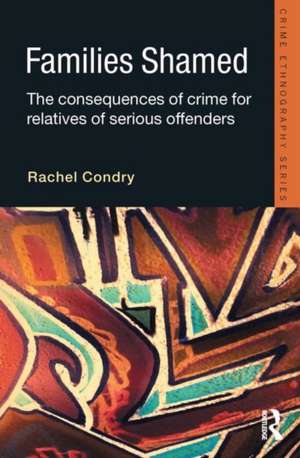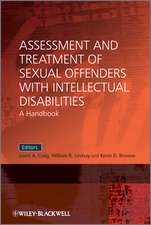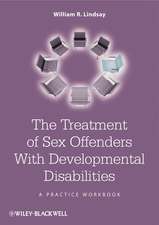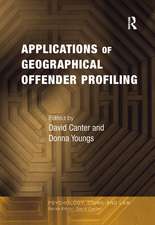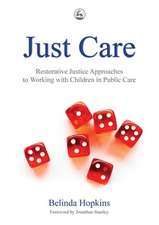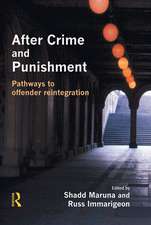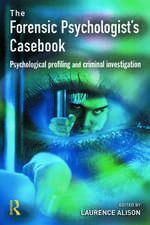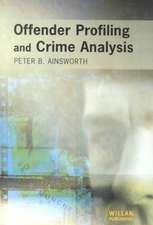Families Shamed: The Consequences of Crime for Relatives of Serious Offenders: Routledge Advances in Ethnography
Autor Rachel Condryen Limba Engleză Paperback – 2009
Families Shamed draws upon intense qualitative research which combines long, searching interviews with the relatives of serious offenders with ethnographic fieldwork over a period of several years. The book focuses on how relatives made sense of their experiences, individually and collectively: how they described the difficulties they faced; whether they were blamed and shamed and in what manner; how they understood the offence and the circumstances which had brought it about; and how they dealt with the contradiction inherent in supporting someone and yet not condoning his or her actions.
This is the first book to tell the story of serious offenders' families, the difficulties they face, and their attempts to overcome them. At the same time a focus on offenders' families also draws our attention to the ways in which women are affected by crime, illuminating the broader effects of crime and the criminal justice process on the proportionately greater number of women involved. It contributes also to wider debates about the social organization of the meanings of crime, and questions the tenability of some core policy assumptions about offenders and their families; the relationship between the state and the family, and its bearing especially on expectations about family responsibilities.
| Toate formatele și edițiile | Preț | Express |
|---|---|---|
| Paperback (1) | 302.75 lei 22-36 zile | +18.31 lei 5-11 zile |
| Taylor & Francis – 2009 | 302.75 lei 22-36 zile | +18.31 lei 5-11 zile |
| Hardback (1) | 784.18 lei 43-57 zile | |
| Taylor & Francis – mai 2007 | 784.18 lei 43-57 zile |
Din seria Routledge Advances in Ethnography
-
 Preț: 311.41 lei
Preț: 311.41 lei -
 Preț: 310.29 lei
Preț: 310.29 lei -
 Preț: 347.38 lei
Preț: 347.38 lei -
 Preț: 413.13 lei
Preț: 413.13 lei -
 Preț: 385.15 lei
Preț: 385.15 lei - 21%
 Preț: 226.50 lei
Preț: 226.50 lei -
 Preț: 294.29 lei
Preț: 294.29 lei - 18%
 Preț: 1058.79 lei
Preț: 1058.79 lei - 18%
 Preț: 1166.68 lei
Preț: 1166.68 lei - 18%
 Preț: 275.26 lei
Preț: 275.26 lei -
 Preț: 448.38 lei
Preț: 448.38 lei -
 Preț: 389.38 lei
Preț: 389.38 lei -
 Preț: 482.17 lei
Preț: 482.17 lei -
 Preț: 381.00 lei
Preț: 381.00 lei -
 Preț: 294.72 lei
Preț: 294.72 lei - 18%
 Preț: 1000.27 lei
Preț: 1000.27 lei - 18%
 Preț: 703.12 lei
Preț: 703.12 lei -
 Preț: 413.33 lei
Preț: 413.33 lei - 19%
 Preț: 267.45 lei
Preț: 267.45 lei -
 Preț: 389.38 lei
Preț: 389.38 lei - 19%
 Preț: 268.83 lei
Preț: 268.83 lei -
 Preț: 381.33 lei
Preț: 381.33 lei -
 Preț: 311.41 lei
Preț: 311.41 lei -
 Preț: 362.64 lei
Preț: 362.64 lei - 18%
 Preț: 1001.21 lei
Preț: 1001.21 lei - 14%
 Preț: 598.24 lei
Preț: 598.24 lei
Preț: 302.75 lei
Nou
Puncte Express: 454
Preț estimativ în valută:
57.93€ • 60.65$ • 47.93£
57.93€ • 60.65$ • 47.93£
Carte disponibilă
Livrare economică 17-31 martie
Livrare express 28 februarie-06 martie pentru 28.30 lei
Preluare comenzi: 021 569.72.76
Specificații
ISBN-13: 9781843925019
ISBN-10: 184392501X
Pagini: 228
Dimensiuni: 156 x 234 x 15 mm
Greutate: 0.34 kg
Ediția:1
Editura: Taylor & Francis
Colecția Willan
Seria Routledge Advances in Ethnography
Locul publicării:Oxford, United Kingdom
ISBN-10: 184392501X
Pagini: 228
Dimensiuni: 156 x 234 x 15 mm
Greutate: 0.34 kg
Ediția:1
Editura: Taylor & Francis
Colecția Willan
Seria Routledge Advances in Ethnography
Locul publicării:Oxford, United Kingdom
Cuprins
Introduction 1. Discovering the Offence 2. Life After Discovery 3. Secondary Stigma, Shame and Blame 4. Making Sense of the Offence 5. Relatives' Own Accounts 6. Self-help for Families of Serious Offenders. Conclusion Appendix 1: Notes on methodology Appendix 2: Interviewee characteristics
Notă biografică
Rachel Condry is a Lecturer in Criminology, and a Fellow of St Hilda's College, Oxford University. Her research interests include: family violence; the families of offenders and victims; the family in youth justice; secondary victimization; narrative accounts and neutralizations; vicarious shame and stigma; the state regulation of parenting and family life.
Recenzii
'This is a pioneering study of the families of serious offenders;it explores the shame and stigma they experience in a careful and thoughtful way. Extremely well-written, it should be read by everybody with an interest in crime and punishment.' − Professor Frances Heidensohn, London School of Economics, UK
Descriere
This book is the first to examine the experiences of relatives of those accused or convicted of serious crimes such as murder, manslaughter, rape and sex offences. It draws upon intense qualitative research which combines long, searching interviews with the relatives of serious offenders with ethnographic fieldwork over a period of several years.
